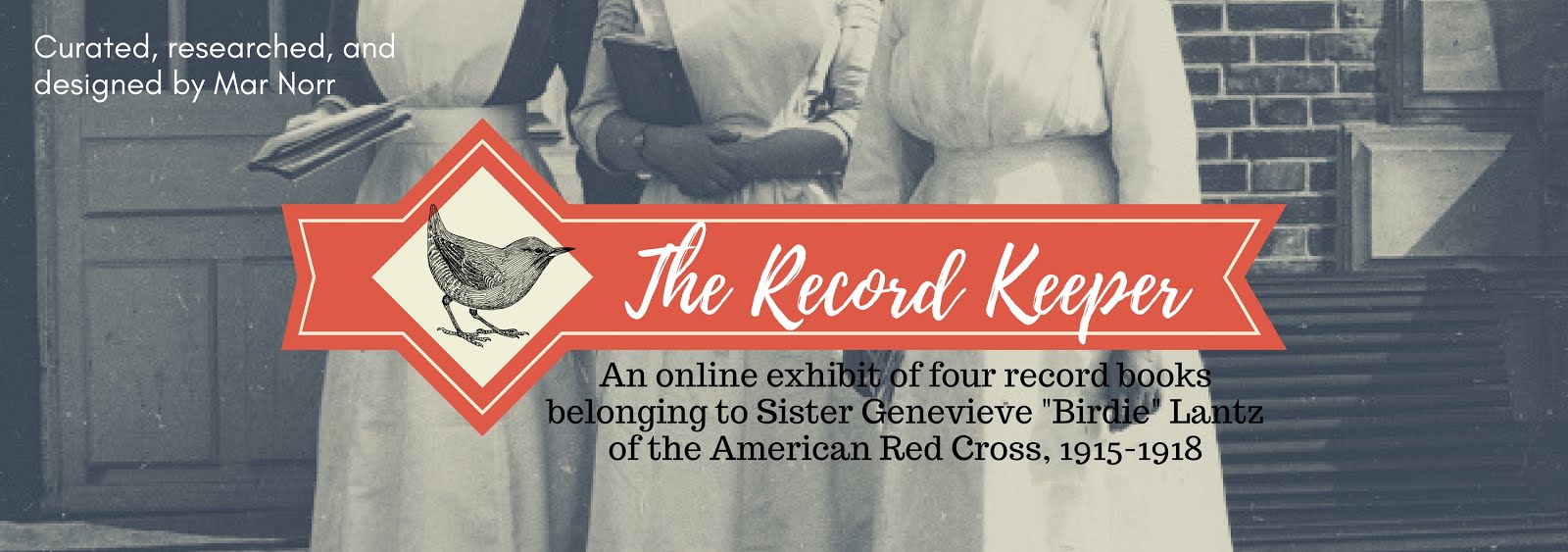Nurses on the front, by virtue of their gender, dealt with conventional gender roles, assuming the domains of mother, sister, sweetheart, and caretaker all at once, which necessitated an attitude of mercy and cheerfulness. Indeed, authors within Sister Lantz’s record books wrote many poems about her gentle smile and kind demeanor, which was expected of women and especially women nurses. Numerous entries liken her to the patients’ literal sister. Others laud her as an idealized ‘Woman’ playing her dutiful, logical part in the wartime struggle. Many entries engage in not-so-subtle flirting, casting Sister Lantz (as well as several other nurses mentioned in the record books) as a surrogate sweetheart or ‘girl back home’. But for one of these patients, Sister Lantz was no surrogate at all; Walter Smith, a Private who had been injured by mustard gas, came into Sister Lantz’s care at the 22nd General Hospital, and at the end of the war, they moved to California and got married. Carol Acton notes in her article, “Negotiating Injury and Masculinity in First World War Nurses’ Writing,” included in the anthology First World War Nursing: New Perspectives, that the relationship between nurse and patient was inherently intimate, suggesting that “the intimate touch that is necessary as a healing ministration...can become the touch of a lover (First World War Nursing: New Perspectives, page 125).” Sister Lantz--sometimes literally, sometimes figuratively--dealt with the same conundrum in the 22nd General Hospital as she assumed the role of “nurse-mother (First World War Nursing: New Perspectives, page 128).” She, like other nurses, had to balance her duties as a cheerful paragon of femininity with the harsh reality of war.
Sister Lantz as nurse and Sister Lantz as lover sometimes became one and the same. For example, we’ve seen this image before in the earlier post, “Art in the Trenches”:
 |
| Lantz, Birdie Genevieve. Record Book Number 4, June-August 1918. Diary. Camiers, France. Western Oregon University Archives. Sister Lantz Record Books. |
When stormy winds have passed and gone[?]
May gentle calm succeed
I in some distant land may roam
Sleep and die all unknown
With these few words I trust
You will a secret find
My word is true and have no doubt
Love is the secret find it out
The rakish, sophisticated Private Ilsley has, as he says, included a secret message; it can be read straight down in the first word of each line: “When may I sleep with you my love?” It is currently impossible to say if Sister Lantz reciprocated Ilsley’s daringly-proclaimed feelings. However, the fact that he made such a proposition obvious to others who wrote in the record book points to a desire to make their ‘relationship’ public or at least discoverable. It is unclear whether Private Ilsley was a patient or a coworker to Sister Lantz, as his service record was destroyed in the British Archives during World War Two bombings along with other service records of the RAMC.
Although he was the most direct, Ilsley was by no means the only serviceman to declare love for Sister Lantz, or to reference love in their poetry in her record books. Other twitterpated poetry featured in the books also cast Sister Lantz as would-be lover, such as the following plea by Corporal Campbell in the fourth record book:
A letter to the one who has forgotten you
My pen is weak my in[?] is ink as [illegible]
My love for you will never fail
I write this letter in black lead
And seal it with a kiss
If you love me as I love you
I hope you will answer this
Cpl Campbell
Or this small token of deep affection by J.H. Ledger:
The cliffs are high the sea is deep
I love you till I cannot sleep
If you love me as I love you
nothing but death will part us two.
Or this cheeky query from A. Smith:
If all the world were good and true,
And perchance contained, but me and you
And no one saw, and no one knew,
Would you?
Or indeed this note, folded and tucked into an envelope in the back of the third record book:
Dear Sister,
Just a few lines asking you what time I shall meet you. Shall I meet you under the clock say about 10.30. Of course it is a secret between our two selves. I do not want the boys to know or they will all want to come. Then I can look into your Blue Eyes and you can look into my Black Eyes. Hoping to hear from you by return of post.
I remain ever yours,
Sloppy Erney Bristoe
Whatever their reasons for writing to Sister Lantz in this way, these men’s poems and notes exemplify the assertion that nurses became surrogate--or sometimes literal--lovers to their patients. The relationship between patient and caretaker was inherently intimate as nurses cared for the men’s bodies and souls as they recovered in their charge. The injured men sometimes projected their gratitude and fondness for their nurses into romantic feelings, and in turn, nurses fostered that intimacy through their job, and therefore may also have engaged in romantic relationships with patients.
It is somewhat ironic that Sister Lantz married the one man who did not write in her record books: Walter Smith. If she did engage in romance with her patients or coworkers like Charles Alfred Ilsley, no record remains of it aside from the notes and poems she saved in her record books.
Sources
Acton, Carol. "Negotiating Injury and Masculinity in First World War Nurses’ Writing.”, In First World War Nursing: New Perspectives, Alison S. Fell and Christine E. Hallett (eds), Routledge, London (2013): 123-138.“Good Send-Off for Roker Moderate: Anti-Socialism: Nothing 'Flashy or Idealistic'.” The Sunderland Echo and Shipping Gazette, April 17, 1934.
Lantz, Birdie Genevieve. Record Book Number 4, June-August 1918. Diary. Camiers, France. Western Oregon University Archives. Sister Lantz Record Books.


